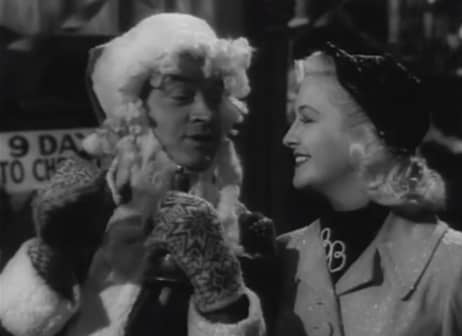Silver Bells is an enchanting Christmas Song about the sights and sounds of Christmas. It’s a truly beautiful and wonderful carol.
Silver Bells: Written By Jay Livington and Ray Evans
Jay Livington and Ray Evans rank as one of the most successful songwriting teams in history. With Livington composing the music and Evans writing the lyrics, the men scored time and time again with award-winning hits such as “To Each His Own” and “Another Time Another Place.” By the early ’50s, having already taken Academy Awards for “Buttons and Bows” and “Mona Lisa,” they were two of the most sought-after songwriters in the country; every movie studio, radio show, and recording artist wanted their latest offering.
Though they scored with hundreds of songs and sales of their tunes climbed into the hundreds of millions, the two are now best remembered for a strange song about a horse and a beautiful ballad about Christmas. Both songs are so popular that most Americans of all ages can sing the words to them.

In 1951 Bob Hope was one of the world’s brightest stars. His name not only guaranteed big box office response at movie theaters, he already was a longtime radio star and had made a successful move to television. Beloved for his selfless work with U.S.O. tours in World War 2 and then Korea, Hope was “Mr. Christmas” to many members of the U.S. Armed Forces, even though he had never scored a hit with a Christmas song. From 1942 on, Bob spent every holiday season with men and women in uniform.
Paramount Pictures scheduled Hope to film a remake of the movie The Lemon Drop Kid, a perfect vehicle for his trademark humor. In the film, Hope would play a small-tiem gambler who owed a large sum of money to the mob. Unable to pay it off, the Kid would work a scam. In the midst of trying to outcon the cons. Bob’s character would fall in love, reform, and escape a large number of near- fatal attacks. Of course, Hope would also find time to sing a song or two. With a cast of great characters surrounding the star, the cast and film crew began work in early 1951.
Livington and Evans, who had put together the wonderful score for Hope’s box office smash Paleface, were called in to write the score for the Lemon Drop Kid. As they reviewed the script, they noted that it was a holiday movie with a new twist.
Holiday Inn, Christmas in Connecticut, and a long list of other films had always been set in the country; now, for the first time in Hollywood history, songwriters were being asked to come up with a Christmas number that didn’t embrace the pleasures of rural life during the holidays. It was a perspective American movies and songs and yet to explore.
After determining where music was needed, the songwriters had a brainstorming session in Evan’s office. As they discussed the script, one of the men picked up a small silver bell and played with it. The tiny noisemaker magically transported the writers to the sidewalks of New York. As they began to think about the way streets and display windows were decorated, the attitudes of happy store managers, and anxious shoppers, and the looks on expectant children’s faces, the song they needed for Bob Hope and costar Marilyn Maxwell’s duet quily came together.
The team had been writing hits long enought to know when they had one, so Livingston and Evans couldn’t wait to take therir latest work to the studio. But before the duo could share their latest composition with Bob Hope, they decided to sing it to Ray’s Wife. The men were chagrined and confused when the woman giggled as they sang. As she doubled over in laughter, the team wondered what had gone wrong.
When Mrs. Evans composed herself, she informed the duo that the chorus was all wrong. It wouldn’t work, she assured them. She pointed out that when others heard it, they would laugh as hard as she had.
The song’s problem could be traced to the small bell that served as its inspiration. Livington and Evans had named their song after the tiny instrument, and the song began, “tinker bell, tinker bell, its’s Christmastime in the city.” As the writers once again listened to the words, they grinned along with Mrs. Evans. They quickly crossed out the word tinker and substituted the word silver.
When released, the Lemon Drop Kid was a moderately successful movie. Yet the film would have probably been quickly forgotten if not for the song “Silver Bells.” Film patrons fell in love with it. This new genre of Christmas song fit well in the new America. After World War 2, Americans had moved to urban areas in droves. This migration meant that more and more people were experiencing the bustle of holidays in cities than ever before.
Livington and Evans’s unadorned descriptions of everything from stoplights blinking red and green (the yellow caution light had not yet been added) to thousands of shoppers rushing from store to store struck a chord with millions who were exposed to those things every day. The bells that anchored the chorus werer everywherer too. They rang in cathedral towers, jingled along horse-drawn carriages, and were constantly chiming in the hands of men and women seeking donations to help feed the poor and needy. In the city, bells, much more than anything else, signaled the coming of the holiday season, “Silver Bells” fully captured this experience in song.

Bob Hope may have introduced “Silver Bells” to the world, but it was his friend Bing Crosby who cashed in on the song’s market potential Bing recorded the hit version of the Livington-Evans collaboration, and soon everyone else seemed to be recording the hit too. When President John F. Kennedy declared it his favorite Christmas song, “Silver Bells” rang out loudly in the White House. By the year 2000, hundreds of different versions of the song had rung up more than 150 million record sales, proving that JFK wasn’t the only one who embraced this sentimental holiday offering as a favorite.
After completing The Lemon Drop Kid, Bob Hope continued to sing “Silver Bells” to U.S. troops at Christmas for more than four decades. His work in Vietnam and other combat arenas helped make him the most honored private citizen in United States history. Hope’s holiday entertainment junkets to the far parts of the globe also earned him the label of “The G.I.’s Santa Claus.”
Though they could have retired and lived on the royalties from their Christmas hit, Jay Livington and Ray Evans continued to write. In 1956 they won their third Oscar for “Que Sera Sera” and scored again with the title song from Tammy. Yet it was the theme song for a very unique television series that ranks right up there along with “Silver Bells” as their most remembered work. The same writing duo that composed the incomparable “Mona Lisa” and incredible “Silver Bells” also gave the world the whimsical and silly them from “Mr. Ed.”


